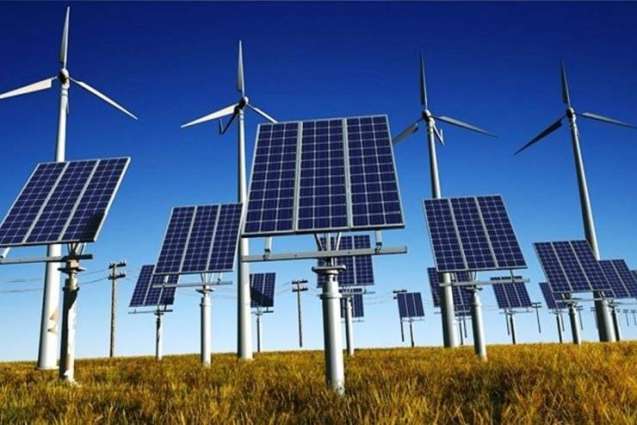The UAE Ministry of Foreign Affairs and International Cooperation (MOFAIC) today announced at Abu Dhabi Sustainability Week 2019 the launch of the third cycle of the US$50 million UAE-Caribbean Renewable Energy Fund (CREF), with funding allocated to projects delivered in Jamaica, Cuba, Suriname, Trinidad & Tobago
ABU DHABI, (Pakistan Point News - 12th Jan, 2019) The UAE Ministry of Foreign Affairs and International Cooperation (MOFAIC) today announced at Abu Dhabi Sustainability Week 2019 the launch of the third cycle of the US$50 million UAE-Caribbean Renewable Energy Fund (CREF), with funding allocated to projects delivered in Jamaica, Cuba, Suriname, Trinidad & Tobago.
Fully financed by Abu Dhabi Fund for Development (ADFD), the leading national entity for international development aid, the UAE-CREF, the largest renewable energy initiative of its kind in the Caribbean region, is a partnership between MOFAIC, ADFD, and Masdar (Abu Dhabi Future Energy Company), the project manager and implementing lead.
Today’s announcement was made during the 9th Session of the General Assembly of the International Renewable Energy Agency (IRENA).
Speaking before the General Assembly, Sultan Al Shamsi, Assistant Minister of Foreign Affairs and International Cooperation for International Development Affairs, noted that the Caribbean region is witnessing remarkable progress in terms of increasing reliance on renewable energy projects, thanks to efforts exerted by the various parties participating in the UAE-Caribbean Renewable Energy Fund, in light of the long-term vision of the countries these projects are implemented in.
"The UAE-Caribbean Renewable Energy Fund will help to enhance energy security and resilience to climate change. It will also contribute to the creation of an environment conducive to attracting more investments and create new jobs in these small islands, supporting the achievement of Sustainable Development Goals, particularly Goal 7 on ensuring access to affordable, reliable, sustainable and modern energy for all, and Goal 13 on taking urgent action to combat climate change and its impacts. We are pleased to launch the Fund's third funding cycle, which will contribute to achieving greater convergence between the UAE and the countries of the Caribbean", he remarked.
Steady progress is being made in the delivery of projects announced under Cycle 1 of the fund. Three projects that broke ground in September have already reached mechanical completion and are due to be inaugurated in Q1 2019.
The projects include a 900-kilowatt (kW) solar photovoltaic (PV) plant with electric vehicle (EV) charging stations in the Bahamas, a 350kW solar PV carport with EV charging stations and a 500kW solar PV plant in Barbados, as well as a 600kW solar PV plant connected to a 600kWh battery in Saint Vincent & the Grenadines.
Altogether, the projects will deliver 2.35 megawatts (MW) of solar and 600 kilowatt-hours (kWh) of battery storage capacity, while displacing over 2.6 million tonnes of carbon dioxide annually. They will also achieve diesel savings of more than 895,000 litres per year, worth about US$1.1 million.
Mohammed Saif Al Suwaidi, Director General of the ADFD, said: "Renewable energy investment is an increasingly important area of development assistance around the world, creating a lasting legacy in terms of both economic and environmental benefits. Together with our partners, ADFD takes great pride in the steadfast advancement of this key initiative."
He added: "Today’s announcement of the Cycle 3 recipients, brings us closer to achieving our ambition of funding renewable energy projects and climate resilience solutions in 16 countries across the Caribbean."
The development and funding agreements for four projects under Cycle 2 of the UAE-CREF have also been successfully completed. They include a solar PV rooftop project and solar PV carport and EV chargers in St Lucia, a remote village electrification project in Belize using hybrid solar PV and battery storage, a hybrid solar PV and diesel power plant with battery storage in Antigua & Barbuda, and a battery system designed to stabilize the electricity grid in Dominica. Construction of all four projects is due to begin this year.
The remaining Cycle 2 projects will be built in the Dominican Republic, Grenada, Guyana, Haiti, and St Kitts & Nevis.
Hatem Mohamed "Through its involvement in the Caribbean Renewable Energy Fund, Masdar is helping to showcase the UAE’s commitment to deliver on the United Nations’ Sustainable Development Goals, while actively delivering renewable energy solutions in a part of the world highly vulnerable to the effects of climate change and lacking access to modern energy services," said Mohamed Jameel Al Ramahi, Chief Executive Officer of Masdar.
"We are privileged to have this opportunity to contribute to the development of the Caribbean’s renewable energy sector, working alongside the Ministry of Foreign Affairs and International Cooperation and Abu Dhabi Fund for Development," Al Ramahi added. "The announcement of the third funding cycle shows we are making good progress towards the fund’s overarching goal of deploying commercial clean energy across the Caribbean."
Launched at Abu Dhabi Sustainability Week 2017, the UAE-CREF aims to deploy renewable energy projects in 16 Caribbean countries to help reduce reliance on fossil fuel imports, stimulate economic activity and enhance climate change resilience.
The UAE-CREF is building on the success of the UAE-Pacific Partnership Fund, which successfully inaugurated clean energy projects in 11 Pacific island countries in 2016.
Expanding the global reach of renewable energy, while increasing climate change resilience through clean technology, is a topic high on the agenda of Abu Dhabi Sustainability Week 2019, which runs from January 12-19.
ADSW 2019 is held under the theme of ‘Industry Convergence: Accelerating Sustainable Development’ and across the six pillars of energy & climate change, water, the future of mobility, space exploration, biotechnology, and technology for good.




